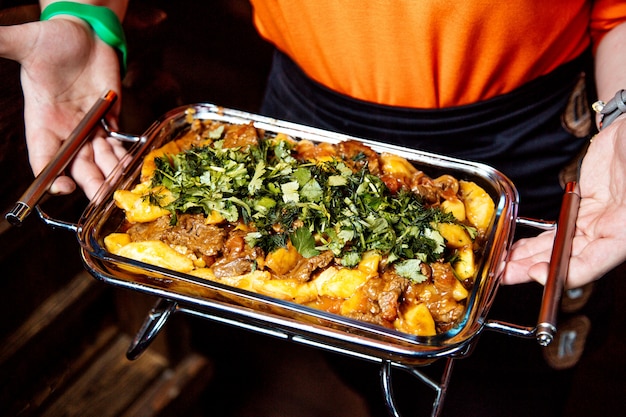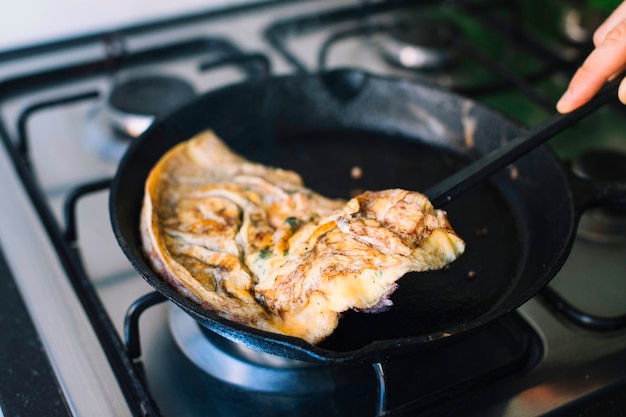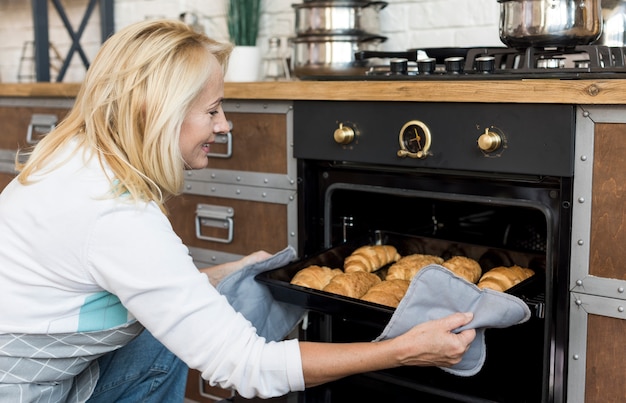You know that feeling when you're craving a light yet satisfying meal? That's where cod comes in, my friend. It's a classic for a reason – it's incredibly versatile, cooks up quickly, and is packed with flavour. And while cod is often thought of as a pan-fried or steamed dish, baking it in the oven unlocks a whole new level of deliciousness. So, grab your favourite baking dish, and let's dive into the world of oven-baked cod.
Part 1: Setting the Stage for a Stellar Baked Cod

The Importance of Freshness – It's All About the Catch
For the best results, always start with the freshest cod possible. I love the atmosphere of a bustling fishmonger, but if that's not an option, head to a reputable supermarket. Look for cod with clear, bright eyes and flesh that springs back when you touch it. Those are signs of a truly fresh catch.
Prepping Your Cod for Baking Success
Okay, you've got your cod – now it's time to get it ready. First, give it a good rinse under cold water, then pat it dry with kitchen paper. This removes any excess moisture and allows for even browning and a crispy skin.
Skin On or Skin Off? The Great Cod Debate
Now, here's a question I get asked a lot: "Should I bake the cod with the skin on?" My answer? It depends! If you're looking for a crispy, almost caramelised skin, go for it. But if you prefer a more delicate texture and don't mind skipping the extra step, skinless cod is the way to go.
Part 2: Baking Cod with Skin: A Crispy Journey to Flavor

Embrace the Crispy Skin – A Texture Revelation
I'm a big fan of baking cod with skin on. It adds a delightful layer of texture and flavour, and honestly, it's a bit of a game changer. The skin acts as a shield, preventing the fish from drying out, and turns into a gloriously crispy treat.
Choosing the Right Baking Dish – The Foundation of Success
For cod with skin, a baking dish is the way to go. It ensures even cooking and helps the skin crisp up beautifully. A shallow baking dish is ideal, but a roasting tin or baking sheet will also do the trick.
The Secret to Perfectly Crispy Cod Skin – A Masterclass in Browning
Let's talk about that crispy skin. It's all about the heat and a little bit of oil. Preheat your oven to a good high temperature, around 190°C (375°F). Then, just before you pop the cod into the oven, drizzle some olive oil over the skin and sprinkle with salt. This creates a barrier that traps in the juices and leads to that irresistible golden-brown finish.
Baking Time: Knowing When It's Just Right
Baking time for cod with skin depends on the thickness of the fillets, but a general rule of thumb is 15-20 minutes. However, always check halfway through – you want the flesh to be opaque and flake easily with a fork.
Part 3: Baking Cod Without Skin: A Delicate Approach

Skinless Cod – A Smooth and Tender Option
You might prefer the smoother texture of skinless cod, or maybe you're just looking for a quicker prep. No judgement here! Baking skinless cod is a great option, and it's surprisingly easy.
Preparing Skinless Cod for the Oven – Drying is Key
The key to baking skinless cod is to ensure it's completely dry before it goes into the oven. Pat it down thoroughly with kitchen paper, removing any excess moisture. This prevents the fish from steaming and turning out soggy.
Baking Time for Skinless Cod – A Little Extra Time
Skinless cod takes a little longer to bake than cod with skin, around 18-22 minutes. Again, make sure to check halfway through to make sure it's cooked to perfection.
Part 4: cooking times for Different Cod Cuts: A Guide to Proper Timing
cod fillets: The Versatile Workhorse
Cod fillets are the most common cut and are incredibly versatile. For fillets, aim for 15-20 minutes in the oven, depending on their thickness.
Cod Loins: A Chunkier Option
Cod loins are a bit thicker than fillets and often have the skin on. They need a bit more time, around 20-25 minutes.
Cod Steaks: The Hearty Choice
Cod steaks are the thickest cut and can take the longest, around 30-35 minutes.
Part 5: Marinade Magic: Unlocking Flavor with a Simple Soak
The Power of Marinades – A Flavor Revolution
A marinade is a game changer for cod. It infuses the fish with a beautiful depth of flavour, enhancing its natural goodness. Think of it as a flavour bath that takes your cod to the next level.
My Go-To Marinade – A Simple, Yet Effective Blend
I'm a big believer in simple marinades. My favourite is a mix of olive oil, lemon juice, garlic, and a sprinkle of fresh herbs. It's bright, flavourful, and complements cod perfectly.
Tips for Marinating: Maximising the Flavor Infusion
The key to a successful marinade is to give it time. I usually marinate my cod for at least 30 minutes, but you can even leave it overnight for a more intense flavour. Just remember to pat it dry before popping it in the oven.
Part 6: Serving Suggestions: Completing the Cod Masterpiece
The Perfect Accompaniment – A Symphony of Flavors
Cod is a wonderfully versatile fish, pairing well with a wide range of flavours and textures. For a classic combination, roasted vegetables like asparagus, broccoli, or sweet potatoes are always a good choice.
side dish Inspiration – A culinary adventure
Here are a few other side dish ideas that complement baked cod:
- Creamy mashed potatoes: A comforting classic.
- A light salad: A refreshing contrast to the richness of the cod.
- green beans with garlic and lemon: A simple yet vibrant side.
- wild rice: A nutty and earthy pairing.
- Couscous: A fluffy and light accompaniment.
Part 7: Baking Cod in Foil: A Quick and Easy Option
The Foil Method – Convenience at Its Best
For a quick and easy option, baking cod in foil is a winner. It helps keep the fish moist and tender and is perfect for busy weeknights.
How to Bake Cod in Foil – A Step-by-Step Guide
Preheat your oven to 180°C (350°F). Place a piece of foil on a baking sheet, add your cod fillets, and season them with salt, pepper, and any herbs or spices you like. Fold the foil over the cod to create a sealed packet. Bake for around 15-20 minutes.
The Importance of Venting: Preventing Soggy Fish
Remember to poke a few small holes in the foil with a fork before sealing it. This allows steam to escape and prevents the cod from becoming soggy.
Part 8: Troubleshooting – Navigating Baking Challenges
Overcooked Cod: A Guide to Reversing the Dryness
We've all been there - you're excited for dinner, but your cod is a little dry. Don't worry, it happens! The trick is to avoid overcooking. Keep a close eye on the fish and check for doneness with a fork. It should flake easily.
Undercooked Cod: A Simple Fix for a Raw Center
If your cod is a bit undercooked, simply pop it back into the oven for a few more minutes, making sure to check it regularly.
Soggy Skin: Remedies for a Less-Than-Crispy Finish
If your cod skin is a bit soggy, you might have overdone it with moisture. Try patting it dry before baking and ensure the oven is nice and hot.
Part 9: The Importance of Resting: A Tip for Ultimate FlavorLetting Your Cod Rest – A Final Touch for Juiciness
This might sound odd, but once your cod is out of the oven, let it rest for a few minutes before serving. This allows the juices to redistribute, resulting in a juicier and more flavorful fish.
Part 10: FAQs – Answering Your Baking Questions
1. Can I bake cod frozen?
It's not ideal to bake cod frozen as it may cook unevenly and end up dry. Always thaw cod completely before baking.
2. How do I know if my cod is cooked?
Your cod is cooked when the flesh is opaque and flakes easily with a fork. You can also check for doneness by inserting a thermometer into the thickest part of the fish. It should register an internal temperature of at least 63°C (145°F).
3. Can I bake cod with other ingredients?
Absolutely! You can bake cod with vegetables, herbs, spices, and even other seafood. Get creative and have fun with it.
4. What are the nutritional benefits of cod?
Cod is a lean source of protein and a good source of omega-3 fatty acids. It's also low in calories and fat, making it a healthy choice for a balanced diet.
5. What are some tips for making a perfect baked cod dish?
- Start with fresh cod and pat it dry before baking.
- Preheat your oven to a high temperature for crispy skin.
- Use a baking dish or a foil packet to ensure even cooking.
- Don't overcook your cod. Check for doneness with a fork.
- Let your cod rest for a few minutes before serving.
Part 11: A Word on Leftovers – Making the Most of Your Baked Cod
Storing Leftover Cod – Keeping It Fresh
If you have any leftover cod, store it in the refrigerator in an airtight container. It should stay fresh for up to 3 days.
Reheating Leftover Cod – Enjoying Your Baked Cod Again
You can reheat leftover cod in the oven, microwave, or even in a frying pan. Just make sure to heat it thoroughly before serving.
Part 12: Experiment and Enjoy – Embracing the Art of Baked Cod
There you have it – a complete guide to baking cod in the oven. Remember, the key is to experiment and find what you enjoy most. There's no right or wrong way to bake cod – just make sure it's cooked through and savour the delicious results. Happy baking!
Everyone is watching

Prime Rib Roast Cooking Time Chart: Per Pound Guide
Cooking TipsPrime rib roast. Just the name conjures images of lavish dinners, crackling fires, and hearty laughter. It’s ...

How Long to Bake Potatoes in the Oven (Perfect Every Time)
Cooking TipsBaked potatoes are a staple in my kitchen. They're incredibly versatile, delicious, and surprisingly easy to m...

Perfect Rice Every Time: The Ultimate Guide to Cooking Rice
Cooking TipsAs a self-proclaimed foodie, I've always been a bit obsessed with rice. It's the foundation of countless cuisi...

The Ultimate Guide to Cooking Asparagus: Tips, Techniques, and Recipes
Cooking TipsAsparagus. The mere mention of this spring delicacy conjures up images of vibrant green spears, crisp and burs...

Ultimate Guide to Cooking the Perfect Thanksgiving Turkey
Cooking TipsThanksgiving. Just the word conjures up images of overflowing tables laden with delicious food, the scent of r...
